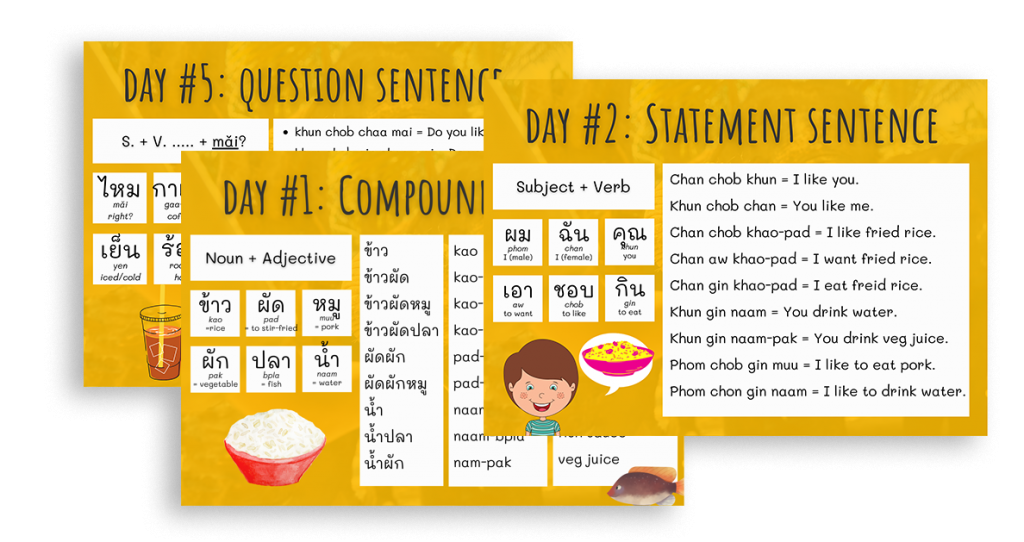As everyone knows, “Yes” in Thai language is “ใช่” /chây/. However, many people misuse this word for anything that means “yes” in English, while in Thai language, there four cases with four ways to say “yes”.
Never say ใช่ /chây/ as “yes” all the time!
In this post, you will find all possible ways to say “yes” properly with great examples. Are you ready to say “yes” like a pro?
Overview
1. Say “Chai” – That’s right!
When someone asks you a Yes/No question and looks for a confirmation. You would use ใช่ /chây/ as “yes” to answer.
- ใช่ /chây/ sounds more like “That is right!”. So you would use it only when you want to confirm the statement.
- ใช่ /chây/ is mostly used when the question ends with “cháy-may” as a question word.
For examples
- A: คุณจะทานข้าวกับฉันใช่ไหม
/khun jà taan-khâo gàb chãn, chây-mãy/
= Will you eat with me?
B: ใช่ครับ ผมจะทานข้าวกับคุณ
/chây khráb, phõm jà taan-khâo gàb khun/
= Yes, I will eat with you.
- A: คุณคือคุณสมชายใช่ไหม
/khun khue Somchai, chây-mãy/
= Are you khun Somchai?
B: ใช่ครับ ผมคือสมชาย
/chây khrâb, phom khue Somchai/
= Yes, I am Somchai.
2. Repeat the verb – to answer a general question
When somebody asks you a general question (no expectation for a confirmation), you should repeat the verb used in the previous question.
For examples
- A: คุณอยากไปภูเก็ตไหม
/khun yàak bpay Phuket mãy/
= Do you want to go to Phuket?
B: อยากครับ
/yàak khráb/
= Yes! (I want to) - A: แม่ไปทำงานวันนี้หรือเปล่า
/mâe bpay tham-ngaan wan-níi rue-plàw/
= Does mom go to work today?
B: ไปค่ะ
/bpay khà/
= Yes! (She goes)2.

Join 5-day Easy Thai challenge
Get a series of short lessons via email to master basic Thai sentences. Best for beginners.
3. Say ‘ká’ or ‘kráb’ – to respond to a call
It is one of the mistakes that foreigners often make. In English, when somebody calls you, you would say “yes?” to respond.
However, in Thai language, we don’t say “yes ” or ใช่ /chây/, instead we use คะ /ká/ or ครับ / krâb/.
- If you are a female speaker, use คะ (ká)
- If you are a male speaker, use ครับ (kráb) Many times men say ครับผม (kráb-phõm) to sound a bit more polite
(Remember ใช่ /chây/ means that’s right in order to confirm the statement only?)
For examples
- A: คุณไมเคิลคะ
/khun Michael ká/
= Khun Michael
B: ครับ
/kráb/
= Yes? - A: นี่ คุณซูซาน
/nîi, khun Susan/
= Hey, khun Susan
B: คะ
/khá/
= Yes?
4. Say ‘ได้ dâi’ – Absolutely, sure! and of course!
When someone initiates to you to do something (like to have dinner, to watch a movie, to go for a walk, etc) , you would say ได้ /dâi/ for the case of confirming the possibility.
For examples
- A: วันนี้ดูหนังตอนสิบโมงกันไหม
/wan-ní duu-nãng dtoorn sib-moong kan mãy/
= Today, do you want to see a movie at 10 am?
B: ได้
/dâi/
= Of course! - A: ไปกินอาหารญี่ปุ่นเย็นนี้กัน
/bpai gin aa-hãan Yîi-pùn wan-ni gan/
= Let’s go to eat Japanese food this evening.
B: ได้ ฉันอยากกินเหมือนกัน
/dâi, chãn yaàak kin muean-kan/
= Sure! I want to eat too.




3 Comments
Nice post. I was checking continuously this blog and I am impressed! Extremely helpful info specifically the last part 🙂 I care for such information a lot. I was seeking this particular information for a long time. Thank you and best of luck.|
I have been surfing online greater than three hours today, but I never found any attention-grabbing article like yours.
Yes! Finally someone writes about website.